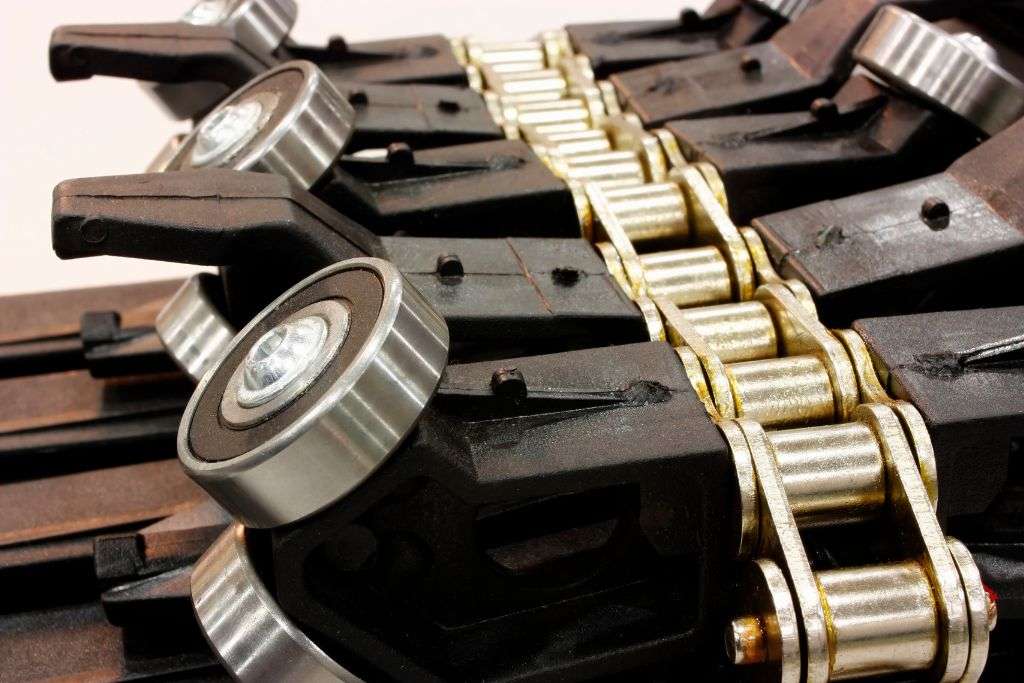
Jun 28,2024
One crucial component that often goes unnoticed when we want to ensure the smooth operation of machinery and equipment is the chain bearing.
Whether you're maintaining an industrial conveyor system, a bicycle, or even a motorcycle, choosing the suitable chain bearing is essential for optimal performance and longevity. This blog post will explore the critical considerations for selecting the perfect chain bearing for your needs.
Chain bearings, those unsung heroes of machinery, keep the world moving. But with a dizzying array of options, picking the right one can feel like navigating a labyrinth blindfolded. Fear not, weary traveler! Here, we will equip you with the knowledge to select the perfect chain bearing, ensuring your machine purrs like a kitten (or roars like a lion, depending on your application).
Imagine this: you're pushing a heavy cart laden with groceries. The wheels groan, and the bearings protest. Now, picture yourself effortlessly gliding along with a lighter cart. That's the difference between matching and mismatching the load capacity of your chain bearing.
Hear the Whine: Listen closely to your machine. Does it emit a high-pitched whine under load? That's a telltale sign the bearings are straining.
Feel the Heat: Run your hand (carefully!) near the bearing housing. Excessive heat indicates the bearing is struggling.
Picture the chain as a tireless runner rhythmically slapping the ground. Now, imagine the bearing as the supportive shoe, absorbing the impact. The right size ensures smooth operation and prevents premature wear.
Measure Up: Grab your calipers and meticulously measure the inner diameter (the hole that fits the shaft) and outer diameter (the width of the bearing) of your existing bearing (or consult your machine's manual). Mismatched sizes can lead to sloppy operation or a bearing that won't fit.
Chain Reaction: Different chain sizes require compatible bearings. Ensure the bearing's roller diameter aligns with the chain's pitch (the distance between chain rollers). A mismatch can cause the chain to bind or jump off the sprocket.
Imagine a racetrack. For a high-speed Formula 1 car, you wouldn't use tires meant for a slow-moving tractor. Similarly, consider the environment in which your machine operates.
Steel yourself: Steel bearings offer unwavering strength for heavy-duty applications with high loads and shock. You'll hear a satisfyingly robust whir as they handle the pressure.
The Nylon Niche: Nylon bearings are your allies for lighter loads and quieter operations. They emit a gentle hum and offer good corrosion resistance in damp environments.
Stainless Steel's Shine: Need a bearing that resists rust and cleans up easily? Stainless steel is your champion. It's perfect for applications involving food processing or frequent washdowns.
Imagine a sandstorm raging through your machine. Without proper seals, the delicate bearings would be like a sandcastle – quickly crumbling. Seals keep contaminants at bay and retain lubrication.
Shielded Bearings offer essential protection from dust and debris. They emit a muffled whir as they spin, making them ideal for clean environments.
Sealed Bearings: Sealed bearings are your warriors for wetter or dirtier environments. They emit a slightly sharper whir but provide superior protection.
Imagine a car engine running dry. Not good! Proper lubrication is vital for chain-bearing longevity.
Grease Up: Many bearings come pre-greased, but consult your manual for relubrication intervals. You'll hear a smoother, quieter operation when adequately lubricated.
When choosing the suitable chain bearing, consider the following factors:
Determine your application's maximum load and select a chain bearing to handle without premature wear or failure.
Different chain bearings have varying speed capabilities. Ensure your choice can handle the rotational speed of your machinery.
Consider the operating environment. Will the bearing be exposed to moisture, dust, or extreme temperatures? Choose a bearing with appropriate seals or coatings.
Think about the ease of maintenance. Some bearings may require more frequent lubrication or replacement than others.
Balance your budget with the need for quality. While precision needle bearings may be more expensive, they can provide significant long-term savings through improved performance and longevity.
Following these steps and considering the factors, you'll transform from a bewildered bystander to a chain-bearing guru. The suitable bearing ensures your machine operates smoothly, saving you time, money, and frustration. So, conquer that labyrinth and keep your machine humming happily!
What distinguishes precision needle bearings from other chain-bearing types?
Discover the unique qualities of precision needle bearings, which are perfect for applications needing high precision and less friction.
Which industries commonly rely on standard chain bearings, and why?
Discover the reliability and durability factors that make standard chain bearings popular across various industrial applications.
How do roller chain bearings contribute to the efficiency of heavy-duty applications?
Uncover the role of cylindrical rollers in roller chain bearings, which are designed explicitly to distribute loads evenly in demanding scenarios like conveyor systems and automotive engines.
What factors should be prioritized when selecting a chain bearing for specific machinery?
Get insights into crucial considerations such as load capacity, rotational speed, environmental conditions, maintenance requirements, and cost to ensure the proper chain-bearing choice for optimal performance.
Suitable chain bearing is essential and can significantly impact your machinery's longevity and functionality. Whether you choose basic chain bearings, precision needle bearings, or any other kind, remember to take load capacity, speed, environmental factors, cost, and maintenance requirements into account. This ensures your equipment runs smoothly and effectively, saving maintenance expenses and downtime.